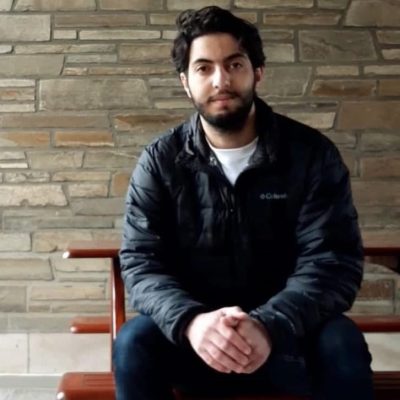Student Spotlight: Rafid Bendimerad

June 6, 2022
Rafid Bendimerad is a doctoral student in aerospace engineering from Algiers, Algeria. He attended the Ecole Nationale Polytechnique in Algiers, Algeria, as an undergraduate and now studies high-efficiency electric propulsion systems for small satellites. Bendimerad is a recipient of the 2022 Africa Fund Fellowship.
What is your area of research and why is it important?
I am working in ASTRALab; a lab that focuses on the study of high-efficiency electric propulsion systems for small satellites.
The quality of how well a propulsion system uses its fuel with the minimum waste is quantified with a parameter that we call the “specific impulse”. The specific impulse of electric propulsion systems is incredibly high compared to conventional chemical propulsion systems that are currently in use. Thus, our goal is to develop a new technology for space exploration that will replace the current one as much as electric cars are replacing conventional cars.
What are the larger implications of this research?
Electric propulsion has the potential to revolutionize space exploration by ensuring the economy of fuel and a more sustainable system of propulsion. It can also offer a continuous production of thrust at a very precise rate over several months or even years, which is adequate for long-term deep space missions to explore outer space as well as for missions that require a high stability of the spacecraft. Thus, predictions are that electric propulsion systems will be ubiquitous in space missions in the coming decades.
What does it mean to you to be a recipient of the Africa Fund Fellowship?
I am really honored and grateful to be awarded the Africa Fund Fellowship. This represents a recognition by the Graduate School of all the efforts that I have been making since the beginning of my Ph.D. program and will certainly encourage me to make more.
What will the fellowship allow you to do that you may not have been able to otherwise?
Since the beginning of my Ph.D., I wanted to investigate and explore new areas in my research; namely, I wanted to apply machine learning techniques in my current numerical simulations. However, I was constrained and limited by the source of funding and had to postpone this project. But starting from this fall, the Africa Fund Fellowship will give me the freedom and the opportunity to study and do research on this new area and, hopefully, make significant contributions in the field of electric propulsion.
What are your hobbies or interests outside of your research or scholarship?
Outside my academic work, I have a large spectrum of interests. I am fond of martial arts; I practiced Taekwondo back in Algeria and I am practicing Brazilian Jiu Jitsu here in Ithaca. I am also a big fan of manga and anime and artworks that are related to them (I decorate my room with prints of my favorite anime characters!). I also like to read about topics related to philosophy, religion, and Arabic literature, and I enjoy listening to Algerian rap music to relax.
Why did you choose Cornell to pursue your degree?
The motto of Cornell is “I would found an institution where any person can find instruction in any study”, and I could totally relate to that. Indeed, during my undergraduate studies I didn’t have the opportunity and the flexibility to study and discover fields that were outside of my major in mechanical engineering because of the nature of the educational system. Thus, I wanted to do a Ph.D. at an institution that allows me to have a cross-disciplinary education to grasp the different facets of knowledge, which Cornell enables me to do by allowing me to take classes in engineering, astronomy, computer science, etc.
